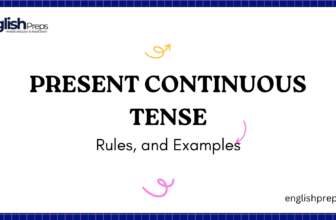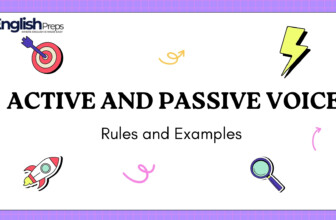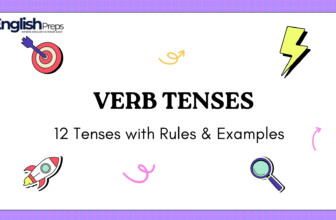
The Present Indefinite Tense, also known as the Simple Present Tense, is a fundamental tense in English grammar. It is used to describe actions, habits, general truths, and recurring events that happen in the present or are considered timeless. This tense allows us to express actions that occur regularly or repeatedly. By using the Present Indefinite Tense, we can communicate effectively about things happening now or events that are always true.
For Example:
- She eats mango.
- They play cricket
Structural Formula:
Subject + Base form of verb + s/es + Object
Note: we only add “s/es” after base verb if the subject is singular.
Table of Contents

When is Present Indefinite Tense Used?
The Present Indefinite Tense has several important applications in our everyday communication. Let’s explore some of its key uses:
Actions in the Present:
We use the Present Indefinite Tense to describe actions happening at the present moment. For example:
- She sings beautifully.
- I eat breakfast every morning.
- The baby cries when she’s hungry
- He reads a book before bedtime.
- They walk to the park every evening.
Habits and Routines:
The Simple Present tense is ideal for expressing actions that are habitual or routine. It helps us talk about activities that occur regularly or repeatedly. Consider these examples:
- They play soccer every weekend.
- He brushes his teeth daily.
- She eats her food twice a day.
- They always arrive early for meetings.
- He exercises at the gym every morning.
General Truths:
The Present Indefinite Tense is used to state facts, general truths, or things that are universally true. Here are some examples:
- Water boils at 100 degrees Celsius.
- The sun rises in the east.
- Water freezes below zero degrees Celsius.
- The Earth orbits around the sun.
- Sound travels faster than light.
Scheduled Events:
When referring to future events that are part of a fixed schedule, we often use the Present Indefinite Tense. For instance:
- The concert starts at 7 p.m.
- The train departs in ten minutes.
- The train departs at 9 a.m. every day.
- The movie starts in ten minutes.
- The class begins at 8:30 a.m. sharp.
Time Expressions:
In the Present Indefinite Tense, time expressions are used to provide information about when an action or event occurs. These expressions help to specify the timeframe of the action or indicate its frequency. Here are some commonly used time expressions in the Present Indefinite Tense:
- Every day: I go for a walk every day.
- Always: She always arrives on time.
- Usually: We usually have dinner at 7 p.m.
- Often: They often visit their grandparents.
- Sometimes: He sometimes plays soccer on weekends.
- On weekends: We go to the beach on weekends.
- In the morning/afternoon/evening: She reads the newspaper in the morning.
- At night: They watch movies at night.
- Once a week/month/year: I go to the gym once a week.
- Every now and then: They go hiking every now and then.
These time expressions help to provide context and clarify the frequency or occurrence of actions in the Present Indefinite Tense. Remember to use them appropriately to convey the intended meaning in your sentences.
How to Form Positive Sentences in Present Indefinite Tense?
To form positive or affirmative sentences in the Present Indefinite Tense, here’s the general structure:
Subject + Base Form of the Verb (+s/es for third-person singular) + Object (optional)
Now, let’s break it down further:
- For most subjects (I, you, we, they, plural nouns), use the base form of the verb:
- I walk to work every day.
- You play the guitar beautifully.
- We enjoy spending time together.
- They speak multiple languages.
- For third-person singular subjects (he, she, it, singular nouns), add “s” or “es” to the base verb:
- He sings beautifully.
- She eats an apple.
- The cat purrs softly.
- John studies English.
Remember the following guidelines for adding “s” or “es” to the base verb:
1. If the base verb ends in a consonant, simply add “s”:
- She plays the piano.
- He walks in the park.
- He eats pizza.
2. If the base verb ends in -s, -ss, -sh, -ch, -x, or -o, add “es”:
- She passes the exam.
- He washes the dishes.
- The watch catches my attention.
- He fixes the car.
- She goes to the office.
3. If the base verb ends in a consonant + y, change the “y” to “ies”:
- He tries his best. (try)
- She flies a kite. (fly)
- It carries a heavy load. (carry)
4. If the base verb ends in a vowel followed by “y,” we simply add an “s” to the base verb when forming positive sentences in the Present Indefinite Tense. Here are some examples:
- She enjoys listening to music.
- He plays the piano skillfully.
- John stays at a beach resort.
- The monkey plays in the trees.
In these cases, since the “y” is preceded by a vowel (a, e, i, o, u), we only need to add an “s” to the base verb to indicate the third-person singular subject.
How to Form Negative Sentences in the Present Indefinite Tense?
To form a negative sentence in the Present Indefinite Tense, we use the auxiliary verb “do” (in the present tense), followed by “not,” and then the base form of the verb.
By following this structure, you can accurately form negative sentences in the Present Indefinite Tense.
Subject + Do/Does + Not + Base Form of the Verb
Now, let’s break it down further:
1. For most subjects (I, you, we, they, plural nouns), use “do not” (don’t) before the base form of the verb:
- I do not like spicy food.
- You do not watch television late at night.
- We do not travel during the winter.
- They do not speak French fluently.
2. For third-person singular subjects (he, she, it, singular nouns), use “does not” (doesn’t) before the base form of the verb:
- He does not eat meat.
- She does not speak Spanish fluently.
- The cat does not chase mice anymore.
- The sun does not set in the west.
Remember, for the negative form, “do not” is used for most subjects, while “does not” is used for third-person singular subjects.
Some additional points to note:
- The contracted forms “don’t” and “doesn’t” are commonly used in informal speech and writing.
- The negative particle “not” is placed after “do” or “does” and before the base form of the verb.
How to Form Interrogative Sentences in the Present Indefinite Tense?
To form interrogative sentences (questions) in the Present Indefinite Tense, follow this structure:
Do/Does + Subject + Base Form of the Verb (+? at the end)
Now, let’s break it down further:
For most subjects (I, you, we, they, plural nouns), use “do” at the beginning of the sentence:
- Do you enjoy reading?
- Do they play basketball?
- Do we live in a beautiful city?
For third-person singular subjects (he, she, it, singular nouns), use “does” at the beginning of the sentence:
- Does he walk to work every day?
- Does she like chocolate?
- Does it rain often in this area?
Remember, for questions in the Present Indefinite Tense, “do” is used at the beginning for most subjects, while “does” is used for third-person singular subjects.
Some additional points to note:
- In the interrogative form, the subject and the auxiliary verb “do” or “does” are inverted.
- The base form of the verb follows the auxiliary verb.
- A question mark “?” is placed at the end of the sentence to indicate that it is a question.
By following this structure, you can accurately form interrogative sentences in the Present Indefinite Tense.
How to Form Double Interrogative Sentences in Present Indefinite Tense?
Double interrogative sentences in the Present Indefinite Tense, also known as “yes/no questions,” are formed by combining the structure of interrogative sentences with the addition of a question word. Here’s the general structure:
Question Word + Do/Does + Subject + Base Form of the Verb (+? at the end)
Now, let’s break it down further:
Choose a suitable question word:
- Common question words include “what,” “where,” “when,” “why,” “who,” “which,” and “how.” Select the appropriate question word based on the information you want to inquire about.
- Use the question word at the beginning of the sentence:
- What do you enjoy doing in your free time?
- Where does he live?”
- When do they start their vacation?
- Why does she always arrive late?
- Who sings the national anthem?
- Which book do you recommend?
- How does it work?
- Follow the question word with “do” for most subjects or “does” for third-person singular subjects.
- Invert the subject and the auxiliary verb “do” or “does.”
- Use the base form of the verb after the auxiliary verb.
- Place a question mark “?” at the end of the sentence.
By incorporating a question word into the structure of interrogative sentences in the Present Indefinite Tense, you can form double interrogative sentences to ask questions that require more specific information or clarification.
Here’s the table with the example sentence for each type of sentence in the Present Indefinite Tense:
| Sentence Type | Structure | Example Sentence |
|---|---|---|
| Positive Sentences | Subject + Base Form of Verb | She sings beautifully. |
| Negative Sentences | Subject + Do/Does + Not + Base Form of Verb | She does not sing. |
| Interrogative Sentences | Do/Does + Subject + Base Form of Verb +? | Does she sing? |
| Double Interrogative | Question Word + Do/Does + Subject + Base Form of Verb +? | What does she sing? |
More Examples of Present Indefinite Tense
Here’s a table highlighting Positive, Negative, and Interrogative sentences in the Present Indefinite tense.
| Type | Positive Sentence | Negative Sentence | Interrogative Sentence |
|---|---|---|---|
| 1st Person | I work at a software company. | I don’t work at a software company. | Do I work at a software company? |
| 2nd Person | You play tennis every weekend. | You don’t play tennis every weekend. | Do you play tennis every weekend? |
| 3rd Person | He reads books in his free time. | He doesn’t read books in his free time. | Does he read books in his free time? |
| She loves to go for long walks. | She doesn’t love to go for long walks. | Does she love to go for long walks? | |
| It rains a lot in this region. | It doesn’t rain a lot in this region. | Does it rain a lot in this region? | |
| Plural | We eat dinner at 7 p.m. every day. | We don’t eat dinner at 7 p.m. every day. | Do we eat dinner at 7 p.m. every day? |
| You speak fluent French. | You don’t speak fluent French. | Do you speak fluent French? | |
| They live in a small town. | They don’t live in a small town. | Do they live in a small town? | |
| General | Cats love to play with yarn. | Cats don’t love to play with yarn. | Do cats love to play with yarn? |
| Birds migrate to warmer regions during winter. | Birds don’t migrate to warmer regions during winter. | Do birds migrate to warmer regions during winter? |
Present Indefinite Tense Practice Exercise
Here’s a practice exercise with 30 fill-in-the-blank sentences for practicing the Present Indefinite Tense. Each sentence will have multiple options to choose from. Select the appropriate verb form to complete each sentence correctly.
Positive Sentences:
- She __________ the guitar. (plays / play / playing)
- We __________ English every day. (study / studies / studying)
- They __________ to the park on weekends. (go / goes / going)
- He __________ movies in his free time. (watches / watch / watching)
- The cat __________ loudly at night. (meow / meows / meowing)
- I __________ a letter to my friend. (write / writes / writing)
- We __________ dinner together as a family. (eat / eats / eating)
- The sun __________ in the east. (rises / rise / rising)
- They __________ soccer on Saturdays. (play / plays / playing)
- She __________ a book before bed. (reads / read / reading)
- He __________ coffee in the morning. (drinks / drink / drinking)
- We __________ hard to achieve our goals. (work / works / working)
- The birds __________ beautifully in the trees. (sing / sings / singing)
- They __________ to different countries. (travel / travels / traveling)
- She __________ ballet with grace. (dances / dance / dancing)
- I __________ to music while I study. (listen / listens / listening)
- We __________ chess on weekends. (play / plays / playing)
- The dog __________ at strangers. (barks / bark / barking)
- He __________ his neighbors with their groceries. (helps / help / helping)
- They __________ math for their exam. (study / studies / studying)
- She __________ fluent French. (speaks / speak / speaking)
- We __________ a movie at the cinema. (watch / watches / watching)
- The train __________ on time. (arrives / arrive / arriving)
- They __________ hiking in the mountains. (enjoy / enjoys / enjoying)
- He __________ the piano skillfully. (plays / play / playing)
- I __________ my room every weekend. (clean / cleans / cleaning)
- We __________ lunch at the cafeteria. (eat / eats / eating)
- The flowers __________ in spring. (bloom / blooms / blooming)
- She __________ history in college. (studies / study / studying)
- They __________ in the pool every afternoon. (swim / swims / swimming)
Here’s a practice exercise with 10 fill-in-the-blank sentences for negative and interrogative sentences in the Present Indefinite Tense. Each sentence will have multiple options to choose from. Select the appropriate verb form to complete each sentence correctly.
Negative Sentences:
- She __________ play the guitar. (does not / did not / do not)
- We __________ study English every day. (does not / did not / do not)
- They __________ go to the park on weekends. (does not / did not / do not)
- He __________ watch movies in his free time. (does not / did not / do not)
- The cat __________ meow loudly at night. (does not / did not / do not)
- I __________ like spicy food. (does not / did not / do not)
- We __________ live in the city. (does not / did not / do not)
- She __________ eat meat. (does not / did not / do not)
- They __________ understand the instructions. (does not / did not / do not)
- He __________ enjoy playing basketball. (does not / did not / do not)
Interrogative Sentences:
- __________ she sing beautifully? (Does / Do / Is)
- __________ you study math for your exam? (Do / Does / Is)
- __________ they play soccer on Saturdays? (Do / Does / Is)
- __________ he watch TV every evening? (Do / Does / Is)
- __________ the dog bark at strangers? (Do / Does / Is)
- __________ you like to dance? (Do / Does / Is)
- __________ she work in an office? (Does / Do / Is)
- __________ they speak Spanish fluently? (Do / Does / Is)
- __________ he play the guitar? (Do / Does / Is)
- __________ you enjoy reading books? (Do / Does / Is)
Simple Present Tense Practice Worksheet






